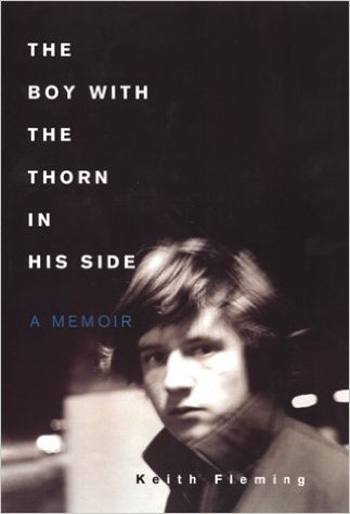 The Boy with the Thorn in His Side
The Boy with the Thorn in His Side
by Keith Fleming
Published by Bargain Price
Published April 3, 2000
History (memoir)
205 pgs. • Find on Amazon.com
Reviewed by Stephen O. Murray
August 7, 2002.
I originally acquired The Boy with the Thorn in His Side, by Keith Fleming, because of my interest in the writing of his mother’s brother, Edmund White, who became his de facto parent during the late 1970s, while White was writing Nocturnes for the King of Naples and having the very vigorous sex life partially recounted in his roman à clef, The Farewell Symphony (and later memoirs).
A sixteen-year-old wreck of a nephew from the Midwest, given the name of Gabriel, appears in the whirlwind of The Farewell Symphony, and I wondered what it could have been like for a very heterosexual boy to have lived in a household of the coauthor of The Joy of Gay Sex and a gay actor who was going crazy onstage every night as the troubled adolescent in Equus, superintended by Richard Burton. [1]From his own experience as a psychiatric case, Fleming finds the adolescent character in Equus and the portrayal of benign psychiatric concern unconvincing—more evidence of his discernment.
By the time Fleming’s narrative gets to Manhattan, I had all but forgotten my original reason for reading the book. Fleming writes very well and makes his descent into a “loony bin” (his label) as compelling as White’s autobiographical novel of his own adolescence, A Boy’s Own Story. There is a power-mad and vicious psychiatrist out of The Cabinet of Dr. Caligari, a wicked stepmother out of the Brothers Grimm, a heedless father out of the American heartland, and a mother who goes in and out of asylums.
From the fog of my own unhappy adolescence, one piece of conventional wisdom I remember is that having sex clears up acne. Like such other conventional wisdom as having sex with a virgin cures venereal diseases, this wisdom is false. Keith had a vigorous (though not “promiscuous”) sex life and seriously disfiguring acne. That it did not occur to a psychiatrist that at least some of the boy’s unease in school and elsewhere stemmed from his pizza face says much about the obliviousness to obvious realities of psychiatrists.
Sprung from the loony bin, Keith went to stay with his Uncle Eddie. Uncle Eddie got him to a dermatologist and supervised a transformation of Keith’s appearance (clothes, shoes, haircut). To pay for a Manhattan prep school, White took on the commercial project of writing The Joy of Gay Sex. Keith was confident in his heterosexuality (“gay sex [was] one of the few things about gay men I wasn’t interested in trying to imitate”), unfazed by all the gay men on the phone and around the apartment.
What Keith found in his uncle’s favorite writers (Nabokov, Proust, Stendahl) was that it was “relatively normal to become bewitched by a girl one has very little in common with.” His uncle helped him arrange getting Laura, his Chicago girlfriend, to Manhattan and set them up in an apartment. Keith was and is appropriately grateful for the generosity of spirit his uncle displayed as well as the expenditures of the very scarce resources of time and money for a writer trying to get established. Neither of Keith’s parents provided any money for his maintenance, and White became the de facto parent of Laura as well as of Keith. With two kids in private school and two rents, he had to find more lucrative work than ghostwriting a U.S. history textbook.
The book does not indicate what its author did after high school (only that he lives in Providence, Rhode Island), but from the insight into his earlier self and appreciation of the interventions (amounting to salvation) by friends and his uncle, it appears he turned out well. His sense of irony may not be as highly developed as his uncle’s, but Keith writes more directly. Sometimes he verges on earnestness, but he often has a sense of humor about himself, and writes engagingly about himself and an unusual cast of characters (a considerably smaller cast than that of The Farewell Symphony). I think the book is a very interesting memory of family dysfunction, madness, and magical intervention even for someone who has not read anything of White’s.
Fleming also wrote a biography of his uncle, Original Youth: The Real Story of Edmund White’s Boyhood (2003). He killed himself in 2010.
published by CultureDose, 7 August 2002
©2002, 2016, Stephen O. Murray

